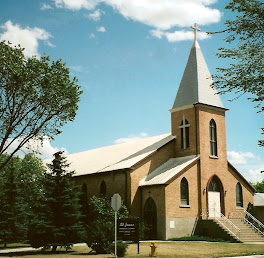The Church often speaks of sacraments as "outward and visible signs of inward and spiritual grace." That's a big complicated way of saying that sacraments are things we do on the outside that touch us on the inside.
You should read the sections of the American Catechism that deal with the Sacraments:
The Diocese of Texas site has a page that talks about the sacraments. So does a neat site called Rev. Rebecca's Explanation and Guide to All Things Anglican.
Each family took home a copy of the Book of Alternative Services. The BAS includes a brief explanatory note before many of the services. Take a read through the notes for each of the sacraments:
- Baptism - pp 146-150 (includes some information on Confirmation)
- Reconciliation - p 166
- Eucharist - pp 174-184
- Marriage - pp 526-527
- Anointing - pp 551-553
- Ordination - pp 631-631
Father Matthew is planning to do an eight part series on the sacraments. So far he only has three of them done. But they are all three well worth watching.
Holy Baptism
Confirmation
Reconciliation
Here are some questions for you to think about. We'll discuss your answers on Sunday.
- Why do we need to have outward signs for inward grace?
- Why do we baptize babies?
- What do we mean when we say that the bread and the wine are the body and blood of Jesus?
- Most Sundays, we include confession and absolution as part of the regular liturgy. Why do we need to have a separate sacrament of Reconciliation?
- Baptism and Confirmation used to be more closely related in time - meaning they used to always be done together. Why do you think they came to be separate rites?
- When the Church anoints a sick person and prays for healing, sometimes the person's physical condition doesn't get any better. Does this mean that the sacrament somehow failed?
- Marriage is a number of things, including both a legal contract and a Christian sacrament. How does our Anglican marriage service indicate each of these things?
- What sort of things should we look for in a person the Church would call to ordained ministry? And who do you know who has these sorts of qualities?
- if and how we will incorporate the foot washing,
- who will read the lessons
- what form to use for the Prayers of the People,
- which Eucharistic Prayer to use,
- what hymns or songs we might include.
That's a lot of stuff to consider and decide, but you've still got the better part of a month.
Pax et bonum,
Malcolm+

